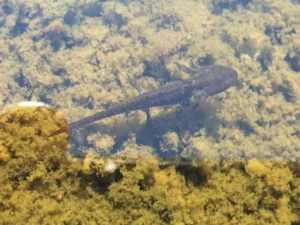If you’ve ever watched a newt sitting quietly in a pond, you might have wondered: can it actually hear what’s going on around it? Can newts hear at all?
Yes, newts can hear, but not the way humans or even frogs do. They don’t have external ears, but they can sense vibrations in both water and land, giving them a way to pick up important signals.
It’s not as sharp as our hearing, but it’s enough for what they need to survive.
Why Don’t Newts Have Ears You Can See?
Look at a frog, and you’ll notice a round disc behind its eyes, that’s its eardrum.

Now look at a newt, and you’ll see nothing like that.

Newts don’t have outside ears at all. No open hole, no visible eardrum, no flap like ours. At first, it might seem like they can’t hear anything.
But under the skin, inside the head, there’s a simple ear structure that still works.
How Do Newts Hear Sounds?
Newts pick up sounds by feeling vibrations. When sound moves through water or air, their skin and bones sense it. The vibrations then travel to their inner ear.
Inside, little parts detect the vibrations and send signals to the brain.
It’s not as detailed as human hearing, but it’s enough for noticing patterns and movement around them.
What Sounds Can Newts Hear Best?
Newts hear low sounds better than high ones. That means they notice deep vibrations more than sharp, high-pitched noises.
For example:
-
They can sense the splash of a predator jumping in the water.
-
They can feel movement nearby.
-
They might even pick up low calls from other amphibians.
But if you clap your hands near a newt, it probably won’t react much. Those sounds in the air are harder for it to catch.
Can Newts Hear Underwater?
Yes, but it’s not like how we hear. Underwater, sounds move faster and farther than in air. Newts sense these mostly through their whole body.

If a fish darts by or a pebble drops in the pond, the ripple travels through the water and into the newt’s skin and bones. That’s enough warning for it to move or stay still.
It’s a system built for knowing what’s happening, not for talking or making sounds.
Do Newts Use Hearing to Communicate?
Not really. Unlike frogs, newts are mostly quiet. They don’t croak or chirp at each other.
They communicate more with touch, movements, and chemicals in the water.
Hearing isn’t their main way to interact with other newts. Still, feeling vibrations helps them notice when other creatures are nearby, especially during breeding season.
How Do Newts Make Up for Simple Hearing?
Since their hearing isn’t strong, newts rely more on other senses:
-
Smell and taste: They use chemicals in water to find mates or notice danger.
-
Sight: Their big eyes help them hunt tiny insects or see movement in low light.
-
Touch: Sensitive skin feels changes in water or air.
These other senses fill in for the gaps in hearing.
Can Newts Hear on Land Too?
Yes, though not as well as in water. On land, they feel vibrations traveling through the ground or air.
If you stomp your foot near a red eft crawling on the forest floor, it might freeze or dash for cover.
But it’s not hearing like we hear. It’s more like feeling the sound. For newts, the line between sound and vibration is blurry.
How Does Hearing Change During a Newt’s Life?
When newts are larvae without legs, they rely mostly on sight and touch. As they grow into juveniles and adults, their inner ear develops more, so they can feel a wider range of vibrations.

Still, they never get the strong, clear hearing frogs have to recognize calls. For newts, hearing is always a supporting sense, not the main one.
Why Is Limited Hearing Enough?
You might think weak hearing would be a problem, but it actually works perfectly for newts.
They don’t need to pick up calls from far away. They don’t rely on spoken signals.
What matters most is knowing what’s happening nearby, danger, prey moving, or a mate brushing past.
Their quiet, vibration-based hearing gives them exactly that. Nothing wasted, nothing extra.
Do Newts Hear Us When We Talk?
Here’s a fun one. If you talk to a newt in its tank, it probably won’t hear your words like a dog or cat would.
The sounds in the air don’t travel well through its simple hearing system.
But if you tap the glass gently or move water in the tank, the vibrations reach it clearly. That’s how it knows you’re there.
So, while it can’t enjoy a conversation, it definitely senses your presence.
Conclusion
So, can newts hear? Yes, but in their own quiet, subtle way. They don’t have outside ears, and they don’t hear sharp details like humans or frogs.
Instead, they feel vibrations traveling through water, the ground, and even their own skin.
This kind of hearing may seem simple, but it’s exactly what they need.
It helps them avoid predators, notice prey, and stay aware of what’s happening around them.
The next time you see a newt freeze after a splash, remember: it just “heard” the world in its own way, tuned not for songs or words, but for survival.
Hi, my name is Ezra Mushala, i have been interested animals all my life. I am the main author and editor here at snakeinformer.com.

